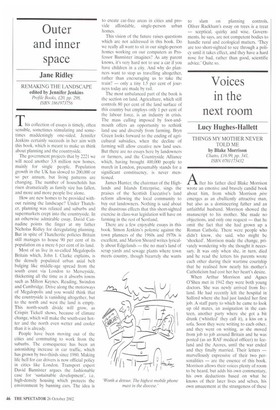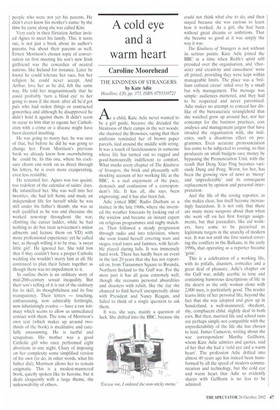Voices in the next room
Lucy Hughes-Hallett
THINGS MY MOTHER NEVER TOLD ME by Blake Morrison Chatto, £16.99, pp. 341, ISBN 0701173432 After his father died Blake Morrison wrote an emotive and bravely candid book about him, from which Morrison pere emerges as an ebulliently attractive man, but also as a domineering father and an unfaithful husband. Morrison showed the manuscript to his mother. She made no objections, and only one request — that he omit the fact that she had grown up a Roman Catholic. There were people who didn't know, she said, who might be 'shocked'. Morrison made the change, privately wondering why she thought it necessary. It was only when she, in turn, died and he read the letters his parents wrote each other during their wartime courtship that he realised how nearly his mother's Catholicism had cost her her heart's desire.
When Arthur Morrison and Agnes O'Shea met in 1942 they were both young doctors. She was newly arrived from Ireland. He had recently left the hospital in Salford where she had just landed her first job. A staff party to which he came to look up old mates, an assignation in the canteen, another party where she got a bit drunk ('whistled' they call it), a kiss on a sofa. Soon they were writing to each other, and they went on writing, as she moved from job to job around Britain and he was posted (as an RAF medical officer) to Iceland and the Azores, until the war ended and they finally married. Their letters — marvellously expressive of their two personalities — are the essence of this book. Morrison allows their voices plenty of room to be heard, but adds his own commentary, his own deductions based on what he knows of their later lives and selves, his own amazement at the strangeness of these people who were not yet his parents. He didn't even know his mother's name: by the time he came along she was called Kim.
Very early in their flirtation Arthur invited Agnes to meet his family. This, it turns out, is not just a book about its author's parents, but about their parents as well. Ernest Morrison's chosen topic of conversation on first meeting his son's new Irish girlfriend was the cowardice of neutral nations, like Ireland for instance. Later he found he could tolerate her race, but her religion he could never accept. And Arthur, love her as he did, felt the same way. He told her magnanimously that he could probably `turn a blind eye' to her going to mass if she must: after all he'd got pals who had stolen things or contracted gonorrhea and although he disapproved he didn't hold it against them. It didn't seem to occur to him that to equate her Catholicism with a crime or a disease might have been deemed insulting.
He was going to marry her, he was sure of that, but before he did he was going to change her. From Morrison's previous book we already know how overwhelming he could be. In this one, where his cocksure charm can work on us direct through his letters, he is even more exasperating, even less resistible.
He renamed her. Agnes was too quaint, too redolent of the calendar of saints' days. He infantilised her. She was well into her twenties; she had left home and made an independent life for herself while he was still under his father's thumb; she was as well qualified as he was and (because she worked non-stop throughout the war, climbing the career ladder, while he had nothing to do but treat servicemen's minor ailments and lecture them on VD) with more professional experience: yet he called her, as though willing it to be true, 'a sweet little girl'. He ignored her. She told him that if they couldn't have a proper Catholic wedding she wouldn't marry him at all. He continued to plan their future together as though there was no impediment to it.
In outline theirs is an ordinary story of mid-20th-century sexual inequality. But their son's telling of it is out of the ordinary for its skill, its thoughtfulness and its fine transparency. Their letters — touching, embarrassing, now admirably forthright, now infuriatingly evasive — have a raw intimacy which seems to allow us unmediated contact with them. The tone of Morrison's own text (which makes up around twothirds of the book) is meditative and carefully unassuming. He is tactful and scrupulous. His mother was a good Catholic girl who once performed eight abortions in one night. Chary of imposing on her complexity some simplified version of his own (to do, in other words, what his father did), Morrison allows her to remain enigmatic. This is a modest-mannered book, quietly spoken like its heroine, but it deals eloquently with a large theme, the unknowability of others.



















































































 Previous page
Previous page